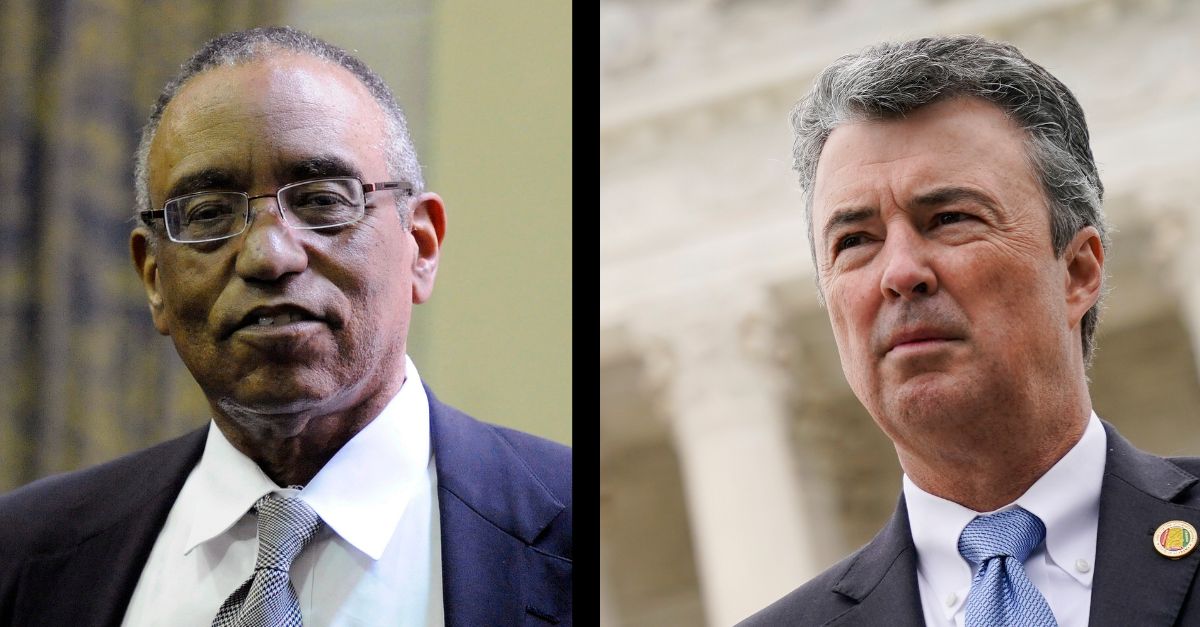
Left: Senior U.S. District Judge Myron Thompson (AP Photo/Jay Reeves.) Right: Republican Alabama Attorney General Steve Marshall (AP Photo/Patrick Semansky, File).
The only Alabama federal judge appointed by a Democrat in decades ruled Monday that a lawsuit challenging the state’s attorney general’s threats to criminally prosecute people who help women travel out of state to get abortions are unconstitutional.
The Yellowhammer Fund, the West Alabama Women’s Center and other abortion rights advocates sued Republican Attorney General Steve Marshall, claiming that his threats to prosecute people who help individuals obtain abortions in states violate constitutional protections including free expression and due process.
Marshall is known for his hard-line anti-abortion views and has indicated that he will criminally prosecute women who have abortions and even use drug laws to secure convictions for women who take abortion pills. Marshall has also supported the prosecution of those who provide medical care to transgender youth and refused to acknowledge that Joe Biden was “duly elected” while he testified against the confirmation of Supreme Court Justice Ketanji Brown Jackson.
After the U.S. Supreme Court overturned Roe v. Wade in 2022, Marshall appeared on various media outlets to promise criminal prosecution of individuals who assist those who cross state lines to get an abortion.
The plaintiff groups alleged that if Marshall’s threats were carried out, they would violate constitutionally-protected rights such as right to travel, freedom of expression, fair warning, and protection against the extraterritorial application of state law.
Marshall moved to dismiss, arguing that the promised prosecution would not amount to constitutional violations and asserting that the plaintiffs lacked standing to even bring their claims.
Senior U.S. District Judge Myron Thompson minced no words about the central issue in the case.
“At its core, this case is simply about whether a State may prevent people within its borders from going to another State, and from assisting others in going to another State, to engage in lawful conduct there,” Thompson began the 98-page ruling.
The judge began by methodically dismantling Marshall’s arguments against standing. He rejected the contention that the plaintiff groups lack the right to sue, noting that Marshall specifically threatened to prosecute any “entity” or “group” that facilitates out of state abortions.
Further, Marshall said, the women’s center and other plaintiffs have a sufficiently close relationship with individuals seeking abortions who would be unlikely to obtain legal relief in court before the end of a pregnancy — and who would likely wish to protect their privacy.
Thompson zeroed in on an argument Marshall offered against the plaintiff groups’ standing: that the Dobbs ruling commented, “abortion cases … have ignored the Court’s third-party standing doctrine.” Thompson slammed Marshall for misreading Dobbs, which “was not a case about standing,” and “did not overrule any precedent [relating to standing].”
“While the Attorney General may wish that a great bulk of the Court’s cases governing standing to assert third-party rights were overruled and that dissenting opinions were instead binding authority, this court must abide by precedent,” Thompson wrote.
Thompson similarly dispensed with Marshall’s argument that the plaintiffs’ right to travel claims should be dismissed. The judge called the right to travel “essential to the structure and character of our nation,” and noted that history dating back to the Magna Carta has shown a reverence for the right to travel freely.
Thompson also reminded Marshall that in Justice Brett Kavanaugh’s Dobbs concurrence, even Kavanaugh seemed pretty clear that the kinds of threats Marshall has been leveling are illegal.
Specifically, Kavanaugh said, “the question whether a State may ‘bar a resident of that State from traveling to another State to obtain an abortion’ was ‘not especially difficult as a constitutional matter’ because ‘the constitutional right to interstate travel’ would prohibit such state action,” reminded Thompson.
Marshall’s argument about the right to travel “contravenes history, precedent, and common sense,” said Thompson.
“Travel is valuable precisely because it allows us to pursue opportunities available elsewhere,” the judge said.
“Alabama can no more restrict people from going to, say, California to engage in what is lawful there than California can restrict people from coming to Alabama to do what is lawful here,” Thompson summarized bluntly.
Thompson also rejected Marshall’s argument that plaintiffs have no constitutional right to help or counsel those seeking abortions, because the First Amendment does not protect criminal activity. Thompson said this argument “ignores the issue at the heart of this case,” which is that the plaintiffs want to help people access lawful abortions.
Therefore, Thompson said, Marshall’s plans to prosecute likely amount to an unconstitutional content-based regulation of free speech that will not survive strict scrutiny.
Thompson sided with Marshall to dismiss the plaintiffs’ claims related to fair warning and overbreadth. However, given that Thompson allowed the two constitutional claims to move forward, the case appears likely to go to trial.
Thompson, 77, is the last Democratic appointee to serve on the U.S. District Court for the Middle District of Alabama, having been nominated by President Jimmy Carter in 1980. He served on the court until 2013, when he took senior status.
Have a tip we should know? [email protected]




